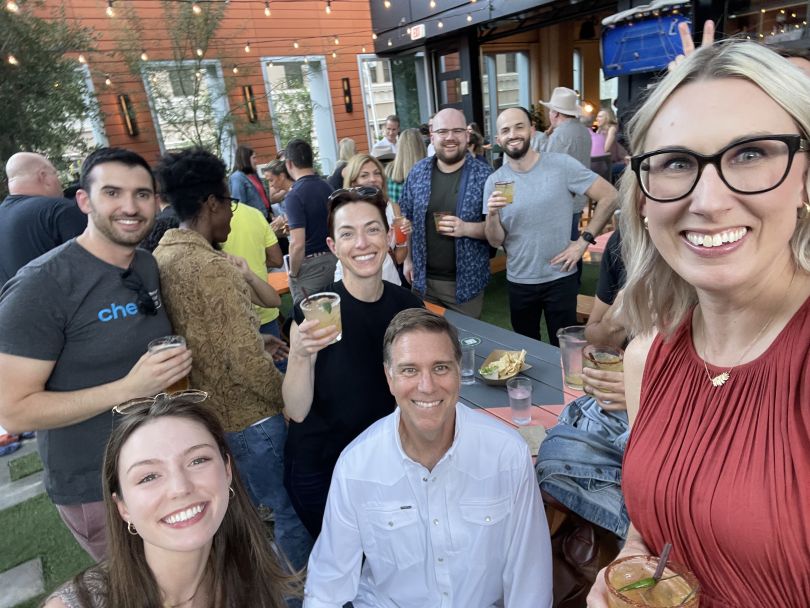While women continue to make strides in tech, inequity lurks beneath the surface.
Eleven percent of women in tech left the field last year — and 22 percent report considering the prospect of switching industries or leaving the workforce altogether. Broken career rungs, hollow work culture and sparse support continue to leave women in tech feeling isolated and adrift.
Fortunately, companies like Carrot Fertility and Check have made it their mission to champion women by providing exemplary mentorship programs, affording family planning support and mitigating the headwinds that block advancement.
While the cornerstone of equity and inclusion is empathy for the individual’s journey, change starts with concrete numbers and transparent reporting.
“We are committed to two-thirds of our sourced candidates from an underrepresented background,” Check VP of People Kelly Jeanes told Built In NYC. “We report on our metrics regularly and keep a close eye on recruiting pipelines and candidate feedback to ensure that our processes are fair.”
While the cornerstone of equity and inclusion is empathy for the individual’s journey, change starts with concrete numbers and transparent reporting.
Check relies on regular pulse surveys, which Jeanes and her team aggregate and share with the entire company.
“We analyze the results by demographic to help us identify anything that might be negatively affecting a single group within the company, including women, and work with managers to address any issues within their teams,” said Jeanes.
Carrot Fertility Chief Human Resources Officer Leslie Neitzel echoes Jeanes’ emphasis on employee feedback.
“It’s a key ingredient to the success of many of our initiatives and programs,” Neitzel said. “We run a quarterly engagement survey soliciting anonymous feedback from all of our employees, including various questions that measure our ability to create an inclusive environment.
“The results are reviewed and analyzed based on a number of factors including where there may be variances between women and men, among other demographics,” she added.
The aggregate results are shared openly, begetting action items to address areas that need improvement.
From robust mentorship programs to career development programs and comprehensive ERGs, both Carrot Fertility and Check keep a consistent pulse on women in their workforce and meet their responses head on with ever-evolving programs. Built In NYC sat down with Jeanes and Neitzel to learn more.

Check is a payroll-as-a-service API that lets customers embed payroll directly in vertical SaaS, HR or time-tracking platforms.
What are some concrete ways Check’s team is addressing some of the biggest challenges facing women in tech?
Ensuring equal pay for all is very important to us at Check. We have transparent pay bands to ensure everyone is compensated fairly. For each performance and compensation review cycle, we perform an equitability analysis to hold ourselves accountable. We also honor Equal Pay Day each year and set commitments for the next 12 months.
We believe in providing the same amount of parental leave regardless of gender and caregiver status. We offer 16 weeks of fully paid leave to all new parents. Furthermore, we want to help parents transition back to work smoothly, so we offer them the option to work a half-time schedule for the first 2 weeks back, at full pay. This return-to-work program gives parents much-needed flexibility to adapt to new childcare arrangements and household routines while they get back up to speed at work.
We have also focused heavily on ensuring gender diversity in leadership and management roles so that women in the organization have female role models and mentors in senior-level positions. Forty-five percent of our leadership team are women, and all of us are also ERG exec sponsors and mentors for women in the organization.
45 percent of Check’s leadership team are women, all of whom are also ERG exec sponsors and mentors for women in the organization.”
What other initiatives does your company have in place to support and elevate women in your company?
By the time Check reached over 40 employees, we rolled out our first official DEI&B philosophy, which we have iterated on multiple times over the past couple of years. Our philosophy outlines our mission, goals and core tenets that both support the goals and guide the specific programming that we invest in as a company. We speak about our DEI&B philosophy at all-hands meetings a couple of times a year. Everyone is encouraged to get involved with our DEI&B efforts in some capacity.
We also have an ERG called Gender Intersects, which I am the executive sponsor for. Gender Intersects strives to elevate the diverse perspectives and experiences of Checketeers through the lens of all genders, beyond the gender binary. It’s a safe space for Checketeers to discuss their gender identity, consider the intersection of gender and other aspects of identity and challenge how gender contributes to our perception of one another in the workplace.
Every other week the ERG hosts a “Gender Stories” series which is an open mic-formatted event that showcases experiences with gender, both positive and negative.
What benchmarks have you set for yourself when it comes to gender equity?
We believe that for our DEI&B efforts to be successful, the initiatives cannot solely live within the people team, so one of our annual company goals is for 85 percent of Checketeers to believe we’re building a diverse and inclusive group — all members of the leadership team are responsible for driving toward this objective. We also share a diversity progress report with the team twice yearly to hold ourselves accountable.
We have recruiting goals in place and are committed to two-thirds of our sourced candidates from an underrepresented background. We report on our metrics regularly and keep a close eye on recruiting pipelines and candidate feedback to ensure that our processes are fair.
Lastly, we share aggregate pulse and engagement survey results with the entire company. We analyze the results by demographic to help us identify anything that might be negatively affecting a single group within the company, including women, and work with managers to address any issues within their teams. This level of transparency and responsiveness both highlights areas that we need to focus on and helps drive change so we are supporting women in the workplace to the best of our ability.
Carrot Fertility is a comprehensive clinical program that delivers cost savings for employers and award-winning experiences for millions of people worldwide.
What are some concrete ways Carrot Fertility’s team is addressing some of the biggest challenges facing women in tech?
Diversity, equity and inclusion are foundational to our success as a company. We have a number of initiatives in place to support those that identify as women at Carrot. Our employee community groups (ECGs) have been a proven way for Carrot employees to get involved in advancing the understanding and inclusion of employees with a common background.
As an example, our ECG for parents was established to provide additional support to working parents, share best practices, engage the outside community through speaker sessions and serve as a community of support within Carrot. Additionally, Carrot offers an inclusive, fully paid 14-week parental leave policy, including return-to-work transition to support new mothers as they acclimate back into work.
Carrot’s compensation philosophy includes salary band transparency as well as an annual pay equity and market analysis to ensure we eliminate bias and drive parity in our compensation decisions.
What other initiatives does your company have in place to support and elevate women in your company?
Carrot offers a comprehensive benefits package to support all of our employees in the moments that matter most in their lives. A few highlights include our Carrot benefit available to all of our employees upon hire.
Carrot offers a comprehensive benefits package to support all of our employees in the moments that matter most in their lives.”
Women, who are often at the center of fertility care decisions and consequences, have access to support for whatever fertility journey they may be on, including IVF, surrogacy, adoption, egg freezing and menopause support, to name a few.
Additionally, Carrot invests heavily in leadership and manager development through various learning and development programs, including peer mentorship in support of developing current and future women in leadership roles.
As a people team, we hold quarterly people reviews with all department leaders, which include a deep dive into various people metrics, including DEI, to highlight where we have made progress and discuss opportunities for further investment. These quarterly reviews ensure the collective leadership team is involved and invested in our continued progress in supporting women and DEI overall.
How do you leverage employee feedback to continue improving your DEI efforts, particularly when it comes to supporting the women on your team?
We run a quarterly engagement survey soliciting anonymous feedback from all of our employees regarding their experiences working at Carrot. The results are reviewed and analyzed based on a number of factors. The aggregate results are shared with employees along with the action items in place to address where there may be trends or opportunities for improvement. We are building out a more robust mentorship program as a result of some of the recent feedback and continue to invest in our ECGs and employee development programs through a variety of learning initiatives surrounding DEI and belonging.









